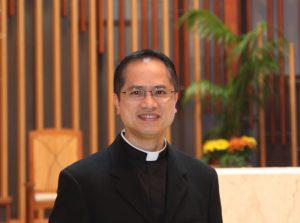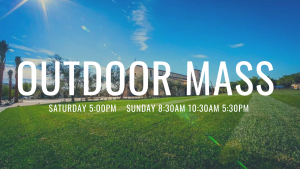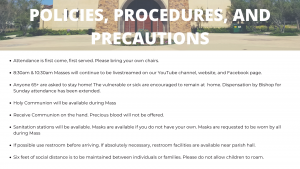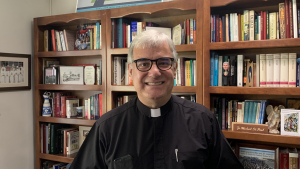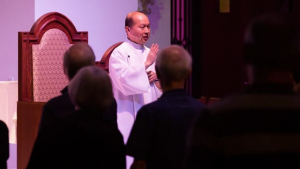Hey Y’all,
I asked Fr. Walter, our friendly, priestly fellow parishioner to write a little something for your consideration. He wisely addressed some spoken and unspoken questions that our pandemic emphasizes. So please read on, thoughtfully and prayerfully. And figure out how you can sincerely sing “Alleluia” in a pandemic, or in any season of your life.
Fr. Reynold
Alleluia in a Pandemic
The simplest things sometimes make the greatest impression. For me, it’s the assembly’s Easter “Alleluia” that goes unsung and unheard. Yes, we have livestreamed celebrations, and that’s good. But virtual celebrations also remind us of what we long to do but cannot: gather together to sing, hear God’s word, celebrate the Eucharist, and go forth to serve as missionary disciples.
Of course we know why. To gather would be to risk spreading sickness with possibly fatal consequences. It’s far better to stay home and, when we must venture forth, keep a safe distance from others. For now, we must do without that graced rhythm of Catholic worship that grounds and graces our lives. But neither the virus nor the disruption it has brought can invalidate the faith that sustains us in this and all seasons.
In a time of pandemic, that statement might elicit hesitation and even skepticism. How can we praise God in the face of so many hospitalizations and deaths, when millions have lost their jobs, their income, and even the ability to feed their families? How can we sing “Alleluia” when so much is so awful and God seems so far away? Other questions quickly follow. Why is there so much evil in our world? How can God allow good people to suffer and evil-doers to prosper? What are we to make of injustice, violence, and bereavement?
Our ancestors in faith wrestled with these same questions. They experienced war, famine, untimely death, disease and pestilence, unjust systems, corrupt officials, dishonest merchants, perjurious witnesses, and so much more. They knew that life can be capricious, unjust, and cruel— often unbearably so—and that human folly and malice contribute greatly to life’s troubles. But they also believed firmly in one God who made all things, a God who transcends all creation and is beyond human manipulation. They worshiped God as infinite, good, loving, wise, powerful, and just. But if God is so good, why is the world so broken and justice so uncommon?
Old Testament writers responded variously, but generally assumed that God treats people according to their deeds, blessing the virtuous and punishing sinners. Explicit in Dt. 30: 15-20, the principle of just retribution upholds God’s justice. It is easily understood and emphasizes the potential consequences of each person’s daily decisions. It appears in the Gospel (John 9:2), and in the strong feeling among people today that grievous suffering should not befall those who did nothing wrong. Yet it does.
This is the central concern in the Book of Job. Mostly written in poetic form, this extraordinary book rebuts the notion that one’s lot in life reflects God’s just judgment. Job is a prosperous and altogether virtuous man who has suffered a series of unspeakably horrible losses and afflictions. With a searing, visceral lament, Job bitterly condemns the day of his birth and longs for the grave (Chap. 3). In the lengthy conversation that follows, Job’s three interlocutors take different approaches to the same conclusion: Job deserves his troubles and should repent of his sin. But Job has not sinned and resolutely defends his innocence, sometimes angrily, to them and to God.
God’s response is given in the speech from the whirlwind (Chaps. 38-41). Composed by a poet of consummate ability, it reviews many signs of God’s power and transcendence, implicitly
emphasizing the infinite gap between God and creation, including Job (see Is. 55: 8-9). Overcome with awe, Job abandons his case against God and, falling silent, folds his troubles into worship. It is a moment of conversion. He has a personal encounter with the living God and it changes him.
The Book of Job boldly challenges the principle of just retribution, and shows how it can lead people to levy unwarranted judgments on themselves, others, and God as well. It recognizes that innocent people do suffer grievously. Most of all, it eloquently asserts that, instead of undermining faith, our sorrows can prompt us to open our hearts as never before to our infinite God, who is by no means limited by our notions of justice. Allowing ourselves to receive and be touched by God’s gift of personal communion, we can set aside human expectations and embrace sacred, healing silence. We stop bargaining and embrace a purer, less self-centered faith, with fewer strings attached. Our love flows more freely into worship, service, and daily life, transforming everything.
Jesus inherited this legacy of Jewish piety and faith, along with the expectation of an innocent but suffering servant who would bring forgiveness to many (Is. 53). Sent by God, he proclaimed the Kingdom and brought God’s saving love to hurting people in a broken world. God though he was, Jesus took our human flesh, pitched his tent among us, and lived our human reality to the full (John 1: 14). Alike to them in all things but sin, he reached out to his brothers and sisters through his healing touch, powerful word, and personal invitation to share his life and mission.
All along the way Jesus felt the bite of injustice, suffering and sorrow. His ministry began with the execution of John the Baptist and ended with his passion and death. Walking among sinful people, he encountered betrayal and bereavement, violence and rejection. And yet he loved his own and loved them to the end (John 13: 1-2). At his core was his personal communion with God his Father and the deep, reciprocal love between them (John 17: 1-3, 20-24). “And being found in human form he humbled himself and became obedient unto death, even death on a cross. Therefore God has highly exalted him and gave him a name above every name, that … every tongue confess that Jesus Christ is Lord, to the glory of God the father” (Phil. 2: 8-11). Suffering transformed, faith vindicated, commitment blessed, love triumphant, brokenness made whole, communion extended. In faith, we receive it all through the outpouring of the Holy Spirit upon us.
As we live through this pandemic, I hope each of us will find time to visit the sanctuary of our hearts, hear God’s voice there, and consider how we will walk the rest of our journey. For sure we’ll still have our trials and troubles as Job and Jesus had theirs. May those challenges lead us to know our loving Lord more personally and be transformed by the communion he offers each one.
That communion with our crucified and risen Lord is the source of our “Alleluia.” It is our inspiration to rejoice, love as we have been loved, proclaim his Gospel, and continue his mission of justice and peace.
The Lord is risen, he is truly risen, Alleluia! Let us rejoice and be glad, Alleluia!
Walter J. Woods


